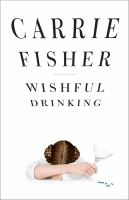 When librarians think about Carrie Fisher, who died on December 27 at age 60, we are just as likely to recall her autobiographical and semi-autobiographical writings as her movies. She wrote with brutal honesty and humor about her struggles with drug and alcohol addiction, mental health, and Hollywood. Starting with Postcards from the Edge, published in 1987, Fisher explored drug addiction, rehabilitation, and recovery through the fictional character of Suzanne Vale, a movie actress. The Best Awful (2003) is a sequel to Postcards from the Edge, in which the Suzanne Vale character discovers that her husband, with whom she has a child, is gay – a close parallel to Fisher’s life. In Shockaholic (2011), the actress delves into electroconvulsive therapy treatments, which she undertook to deal with her bipolar disorder. My favorite of her books, however, is Wishful Drinking, in which she lays bare her life – a childhood in the shadow of her parents, Debbie Reynolds and Eddie Fisher, a relationship with Paul Simon (as a result of which I can never listen to a Paul Simon song with a straight face again), her marriage, her troubled mental health, and the drug and alcohol addiction that gives rise to the book’s title. Wishful Drinking is funny, sad, truthful, and poignant. And, now, after Carrie Fisher’s death at such a young age, it is the most bittersweet of memoirs.
When librarians think about Carrie Fisher, who died on December 27 at age 60, we are just as likely to recall her autobiographical and semi-autobiographical writings as her movies. She wrote with brutal honesty and humor about her struggles with drug and alcohol addiction, mental health, and Hollywood. Starting with Postcards from the Edge, published in 1987, Fisher explored drug addiction, rehabilitation, and recovery through the fictional character of Suzanne Vale, a movie actress. The Best Awful (2003) is a sequel to Postcards from the Edge, in which the Suzanne Vale character discovers that her husband, with whom she has a child, is gay – a close parallel to Fisher’s life. In Shockaholic (2011), the actress delves into electroconvulsive therapy treatments, which she undertook to deal with her bipolar disorder. My favorite of her books, however, is Wishful Drinking, in which she lays bare her life – a childhood in the shadow of her parents, Debbie Reynolds and Eddie Fisher, a relationship with Paul Simon (as a result of which I can never listen to a Paul Simon song with a straight face again), her marriage, her troubled mental health, and the drug and alcohol addiction that gives rise to the book’s title. Wishful Drinking is funny, sad, truthful, and poignant. And, now, after Carrie Fisher’s death at such a young age, it is the most bittersweet of memoirs.
Requiescat in pace
Posted in General, Reviews and Recommendations.
